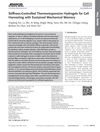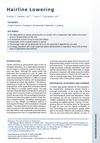 55 citations,
September 2017 in “Expert Opinion on Drug Discovery”
55 citations,
September 2017 in “Expert Opinion on Drug Discovery” Different factors affect where drugs are absorbed in the small intestine, which is important for effective medication use.
[object Object]  54 citations,
May 2017 in “Biomedicine & Pharmacotherapy”
54 citations,
May 2017 in “Biomedicine & Pharmacotherapy” Edible seeds from the Cucurbitaceae family like pumpkin and watermelon seeds are nutritious and may have health benefits, but eating too much can cause side effects.
 49 citations,
March 2018 in “Toxicological sciences”
49 citations,
March 2018 in “Toxicological sciences” Low doses of mixed chemicals cause permanent reproductive malformations in male rats.
 48 citations,
July 2001 in “Clinics in Dermatology”
48 citations,
July 2001 in “Clinics in Dermatology” Cosmetics enhance beauty, fix defects, and intimidate enemies, with varying cultural standards and alternative methods.
 47 citations,
August 2014 in “The Journal of Clinical Endocrinology and Metabolism”
47 citations,
August 2014 in “The Journal of Clinical Endocrinology and Metabolism” The research suggests that the global distribution of PCOS is likely due to historical human migration and that genes affecting PCOS may have different impacts on males and females.
 47 citations,
January 2003 in “American Journal of Clinical Dermatology”
47 citations,
January 2003 in “American Journal of Clinical Dermatology” Mood stabilizers can cause serious skin reactions; careful monitoring and immediate treatment are crucial.
 47 citations,
November 1982 in “Journal of Cardiovascular Pharmacology”
47 citations,
November 1982 in “Journal of Cardiovascular Pharmacology” Nitrendipine and nifedipine effectively block muscle contractions, while papaverine relaxes them and minoxidil needs high amounts to work.
 43 citations,
May 1978 in “JAMA”
43 citations,
May 1978 in “JAMA” Minoxidil controls blood pressure but may cause kidney damage and needs diuretics to prevent swelling.
 42 citations,
January 2018 in “Expert review of precision medicine and drug development”
42 citations,
January 2018 in “Expert review of precision medicine and drug development” Drug repositioning is becoming more targeted and efficient with new technologies, offering personalized treatment options and growing interest in the field.
 42 citations,
January 2006 in “Obstetrical & Gynecological Survey”
42 citations,
January 2006 in “Obstetrical & Gynecological Survey” The document concludes that correct diagnosis and management of PCOS are important, and more research is needed on its risks and treatments.
 40 citations,
March 2018 in “Aesthetic Surgery Journal”
40 citations,
March 2018 in “Aesthetic Surgery Journal” New treatment combining PRP and SVF increases hair density in 6-12 weeks for androgenetic alopecia patients.
 38 citations,
April 2018 in “Psychopharmacology/Psychopharmacologia”
38 citations,
April 2018 in “Psychopharmacology/Psychopharmacologia” Blocking CRF-R1 can reduce alcohol intake in stressed mice.
 35 citations,
January 2014 in “Postepy Dermatologii I Alergologii”
35 citations,
January 2014 in “Postepy Dermatologii I Alergologii” DHT's role in hair loss is important, but measuring its level for diagnosis is questionable.
 34 citations,
July 2011 in “Journal of Dermatological Treatment”
34 citations,
July 2011 in “Journal of Dermatological Treatment” Curcuma aeruginosa extract combined with minoxidil effectively treats male-pattern baldness.
 34 citations,
January 1977 in “American Journal of Cardiology”
34 citations,
January 1977 in “American Journal of Cardiology”  32 citations,
May 2010 in “Pharmacopsychiatry”
32 citations,
May 2010 in “Pharmacopsychiatry” Finasteride reduces new brain cells in male mice, possibly causing depression.
 31 citations,
October 2013 in “Psychosomatics”
31 citations,
October 2013 in “Psychosomatics” Psychotropic medications can cause skin reactions, including severe conditions like SJS and TEN, and it's important for psychiatrists to recognize and manage these side effects.
[object Object]  26 citations,
January 1978 in “Nephron”
26 citations,
January 1978 in “Nephron” Minoxidil lowers blood pressure effectively but may cause side effects.
 25 citations,
January 2013 in “Journal of Industrial and Engineering Chemistry”
25 citations,
January 2013 in “Journal of Industrial and Engineering Chemistry” Some herbal extracts, especially when used in cubosomal suspensions, were as effective as Minoxidil in promoting hair growth.
 25 citations,
May 2012 in “Journal of The European Academy of Dermatology and Venereology”
25 citations,
May 2012 in “Journal of The European Academy of Dermatology and Venereology” Many Korean patients with hair loss, skin allergies, and psoriasis use alternative medicine, but satisfaction is low.
 24 citations,
January 2020 in “International Journal of Molecular Sciences”
24 citations,
January 2020 in “International Journal of Molecular Sciences” Some plants with flavonoids may help treat hair loss and promote hair growth.
 24 citations,
July 2016 in “Revue Neurologique”
24 citations,
July 2016 in “Revue Neurologique” Gilles de la Tourette syndrome is treatable, with behavioral therapy as a recommended first option and other treatments available for more severe cases.
 22 citations,
June 2018 in “Journal of Neuroinflammation”
22 citations,
June 2018 in “Journal of Neuroinflammation” Procyanidins from grape seeds reduce nerve pain by blocking specific proteins and inflammation.
 22 citations,
January 2017 in “Advanced Healthcare Materials”
22 citations,
January 2017 in “Advanced Healthcare Materials” The hydrogels help harvest cells while preserving their mechanical memory, which could improve wound healing.
 22 citations,
August 2013 in “Facial Plastic Surgery Clinics of North America”
22 citations,
August 2013 in “Facial Plastic Surgery Clinics of North America” A cosmetic procedure can lower the hairline by up to 10 cm, with high satisfaction but potential for temporary sensation loss and rare risks.
 22 citations,
April 1998 in “Dermatologic Clinics”
22 citations,
April 1998 in “Dermatologic Clinics” Interferons are effective for some skin conditions and cancers, but can have side effects and need more research for optimal use.
 21 citations,
July 1988 in “Clinics in dermatology”
21 citations,
July 1988 in “Clinics in dermatology” Good haircare and communication with doctors are key for managing hair loss.
 20 citations,
October 2018 in “Aesthetic Plastic Surgery”
20 citations,
October 2018 in “Aesthetic Plastic Surgery” PRP shows promise for improving facial wrinkles, skin elasticity, and hair growth, but more research is needed to standardize its use and understand its effects.
 19 citations,
February 2007 in “International Clinical Psychopharmacology”
19 citations,
February 2007 in “International Clinical Psychopharmacology” Quetiapine may cause hair loss, a side effect not widely recognized before.
 18 citations,
January 1999 in “CNS Drugs”
18 citations,
January 1999 in “CNS Drugs” Some anticonvulsant drugs can cause skin reactions, ranging from mild to severe, and managing these reactions is important for patient care.






























